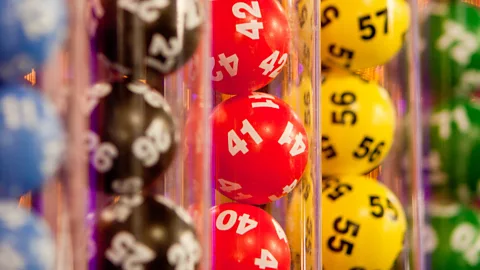A lottery win could change the way you vote
 Getty Images
Getty ImagesA big lottery win might not just change your finances – it could also affect your politics.
A South Carolina lottery ticket holder has won $1.6bn (£1.24bn) billion in the Mega Millions lottery. It is the largest jackpot in US history. The money could change a lot of things for the winner – including their political views.
Research published in 2014 on lottery winners in the UK found that they became more right wing after their windfall.
Using data from the British Household Panel Survey of more than 25,000 UK adults, the researchers followed changes in the political preferences of lottery winners from 1996 to 2009.
A total of 4,277 of the survey participants were lottery winners who had also recorded their political beliefs. They rated their views from one to seven, where one was strongly supporting left-wing Labour, and seven was strongly supporting the Conservatives, the UK’s leading right-wing party.
You might also like:
Winning more than £500 ($645) shifted people’s views approximately 0.13 points on the scale to the right. That’s equivalent to about a 2% shift towards the Conservative end of the spectrum.
It might not sound like a huge shift, but it was significant compared with other factors that influence an individual’s politics, such as education. Completing secondary education to age 18 nudged people along the political spectrum by nearly 4% to the right, compared with people who have no formal education, according to the survey data. And the greater the lottery win, the greater the shift to the right.
There’s a well-established link between having more money and being more right wing, but this is tricky to disentangle from the values people grow up with and the social circles they move in. Using the data on lottery winners suggests that having a lump sum of cash land in your bank account – whatever your background and prior beliefs – really does cause a significant shift in views.
Exactly why lottery winners shift to the right isn’t clear. But part of it could be to do with a newfound sense of entitlement that winners feel towards their cash, says Nattavudh Powdthavee, a behavioural scientist at Warwick Business School and co-author of the study.
{"image":{"pid":"p06pv657”}}
“We know that if the money you get is through earnings, you feel entitled to it – you feel that you’ve worked hard for it,” Powdthavee says. “We didn’t really expect the lottery win to have the same effect.”
Because of this attitude towards their money, winners become more reluctant to see it redistributed through taxes, Pawdthavee says. Studies in the US have also found that lottery winners are less likely to support the redistribution of wealth through taxes.
An implication of the study is that people’s political beliefs are more fickle than some would like to think.
“Most people who do research on political preferences believe that they are almost inborn. You grow up and gain a strong political belief that won’t be shifted,” Powdthavee says. “But even something like a lottery win can shift our core beliefs.”
--
If you liked this story, sign up for the weekly bbc.com features newsletter, called “If You Only Read 6 Things This Week”. A handpicked selection of stories from BBC Future, Culture, Capital, and Travel, delivered to your inbox every Friday.
